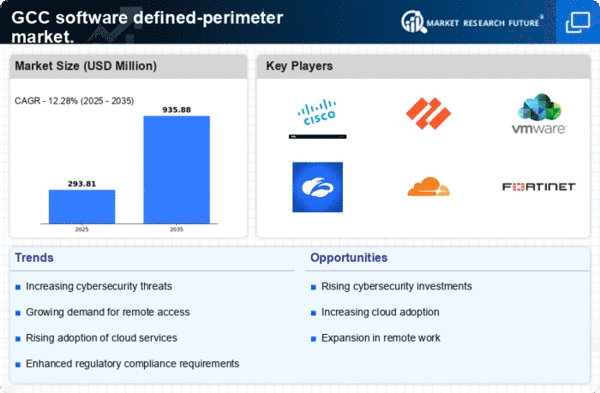Growing Cloud Adoption
The rapid adoption of cloud services in the GCC is a key driver for the software defined-perimeter market. As organizations migrate to cloud environments, they require secure access to cloud-based applications and data. The software defined-perimeter model offers a solution that enhances security by creating a secure perimeter around cloud resources. In 2025, cloud spending in the GCC is projected to reach $10 billion, indicating a strong trend towards cloud integration. This growth in cloud adoption is likely to propel the software defined-perimeter market, as businesses seek to protect their cloud assets and ensure secure connectivity.
Rising Cybersecurity Threats
The software defined-perimeter market is experiencing growth due to the increasing frequency and sophistication of cyber threats. Organizations in the GCC are recognizing the need for robust security measures to protect sensitive data and critical infrastructure. In 2025, it is estimated that cybercrime could cost businesses globally over $10 trillion annually. This alarming figure is prompting a shift towards advanced security solutions. The software defined-perimeter model offers a proactive approach to security. It enables organizations to create secure access points and minimize vulnerabilities. As cyber threats evolve, the demand for innovative security frameworks within the software defined-perimeter market is likely to rise, compelling businesses to invest in comprehensive security strategies.
Increased Remote Work Adoption
The shift towards remote work in the GCC has created a pressing need for secure access to corporate resources. The software defined-perimeter market is benefiting from this trend as organizations seek to implement secure remote access solutions. With an estimated 70% of the workforce in the region working remotely by the end of 2025, the demand for secure connectivity is paramount. The software defined-perimeter model facilitates secure access to applications and data, regardless of location, thereby addressing the challenges posed by remote work. This trend is likely to drive investments in software defined-perimeter solutions, as businesses prioritize security in their remote work strategies.
Regulatory Compliance Pressures
Increasing regulatory compliance requirements in the GCC influence the software defined-perimeter market. Organizations are facing stringent regulations regarding data protection and privacy, necessitating the implementation of robust security measures. The software defined-perimeter model provides a framework that helps organizations meet these compliance standards by ensuring secure access and data protection. In 2025, it is anticipated that compliance-related investments in the region will exceed $5 billion, highlighting the importance of security solutions in achieving regulatory adherence. As businesses navigate complex compliance landscapes, the software defined-perimeter market is likely to see heightened demand for solutions that facilitate compliance.
Digital Transformation Initiatives
The ongoing digital transformation across various sectors in the GCC is a significant driver for the software defined-perimeter market. Organizations are increasingly adopting digital technologies to enhance operational efficiency and customer engagement. This transformation necessitates a secure environment for data exchange and application access. The software defined-perimeter model aligns with these initiatives by providing a flexible and scalable security framework. In 2025, the GCC region is projected to invest approximately $30 billion in digital transformation, further fueling the demand for software defined-perimeter solutions. As businesses seek to leverage digital tools while ensuring security, the software defined-perimeter market is poised for substantial growth.
















